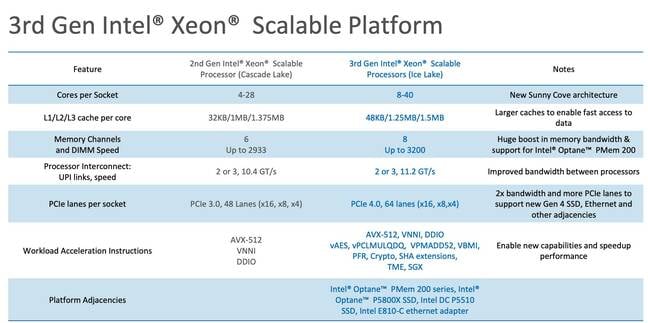This article is more than 1 year old
Ice Lake, Baby: Intel's 10nm 3rd Gen Xeon Scalable server processors to arrive at last
Stop, collaborate and listen, Chipzilla's back with its brand new invention
Intel on Tuesday announced the availability of its "Ice Lake" 3rd Gen Xeon Scalable processors, intended for applications running on servers, high-end workstations, and in data centers.
And, yes, this is Intel's first Xeon Scalable processor family on its much-delayed 10nm process node.
"Our 3rd Gen Intel Xeon Scalable platform is the most flexible and performant in our history, designed to handle the diversity of workloads from the cloud to the network to the edge," said Navin Shenoy, EVP and general manager of Intel's Data Platforms Group, in a statement.
As part of its Ice Lake platform, Intel also launched its Optane persistent memory 200 series, its Optane SSD P5800X and its NAND-based SSD D5-P5316, its Ethernet 800 Series Network Adapters, and its latest Agilex FPGA.
"We're delivering several processor platform technology enhancements that directly provide benefit across a wide range of customer use cases," said Lisa Spellman, corporate VP of Intel's Xeon and memory group, in a media briefing last week. "We believe we're delivering true flexibility for our customers.
"We're bringing artificial intelligence everywhere and we continue to make purpose-driven choices so that Xeon is able, capable, and proficient at serving all workloads from the edge to the cloud, through the network."

Intel celebrates security of Ice Lake Xeon processors, so far impervious to any threat due to their unavailability
READ MORESpellman cited three noteworthy capabilities in the Ice Lake line, which is based on Intel's Sunny Cove microarchitecture. First, she said, the 3rd Gen Xeon is Intel's first mainstream two-socket processor to feature SGX – Software Guard Extensions – available previously on the Xeon E platform. Second, the Ice Lake Xeon features integrated AI acceleration via Intel's Deep Learning Boost technology. Thirdly, the chip includes the company's built-in Crypto Acceleration.
Intel claims its 10nm Ice Lake chip delivers a performance improvement of as much as 46 per cent compared to its predecessor in popular data center workloads. Instructions per cycle (IPC) are said to be 20 per cent better, when a 28-core 3rd Gen Xeon is compared to a 2nd Gen Xeon, other factors being similar. AI inference, on BERT language processing, is said to be up to 74 per cent better.
On "a broad mix of 20 popular AI & ML workloads," Intel claims its 3rd Gen Xeon offers 1.5x better performance than the AMD EPYC 7763 (Milan) and 1.3x better performance than the Nvidia A100 GPU.
Spellman said Intel believes that AI represents a market opportunity of roughly $20bn by 2025.
The latest Xeon includes several new instructions and architectural features to help parallelize cryptographic functions. These include: big-number arithmetic (AVX-512 Integer IFMA), Vector AES and Vector Carry-less Multiply Instructions, Galois Field New Instructions (GFNI), SHA-NI, and Vector Bit Manipulation Instruction (VBMI), among others.
Against a five-year-old Xeon system (Broadwell, E5-2699v4), Intel's latest manages 2.65x better performance, or so we're told.
The Ice Lake Xeons range from 8 to 40 cores, and accommodate up to 6TB of system memory per socket, up to 8 channels of DDR4-3200 memory per socket, and up to 64 lanes of PCIe Gen4 per socket.
Ice Lake also brings security improvements in the form of total memory encryption, to allow the bulk encryption of the entire memory space, and Intel Platform Firmware Resilience [PDF], which protects against boot and runtime attacks, said Spellman.
"We have all major cloud service providers planning to deploy services based on Ice Lake with their first services coming online starting in April," she said, noting that over 200,000 units have already shipped to customers. "We have over 50 unique OEMs and ODMs that are set to launch over 250 isolate-based designs out into the market." ®
For more commentary and detail, check out Timothy Prickett Morgan's analysis on our sister site, The Next Platform.
PS: Reviewers gave Intel a shoeing for its 14nm Rocket Lake 11th-gen Core i9-11900K and i7-11700K desktop processors. The chips, with CPU cores based on Ice Lake's Sunny Cove, were designed for 10nm but back-ported to 14nm, which introduced compromises.

